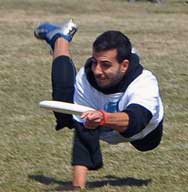 KINGSTON, R.I. – February 26 , 2015 – The URI men’s and women’s Ultimate Frisbee teams want to win just like any other athletic teams, but their perspectives are different than most.
KINGSTON, R.I. – February 26 , 2015 – The URI men’s and women’s Ultimate Frisbee teams want to win just like any other athletic teams, but their perspectives are different than most.
Instead of a win-at-all cost mentality, the URI players prize sportsmanship, friendship and most importantly fun. Still, they pay attention to the standings just like any other team and are disappointed when the scoreboard is unkind to them. And don’t tell them Ultimate isn’t a sport. Just about every player logs miles of running in just a single game.
The running, throwing and catching begin in earnest this month, as the men host the URI Huckbuddy Invite 2015 Saturday, April 4 and Sunday, April 5, from 9 a.m. to 4 p.m., each day at the Mayfields on the Kingston campus, 136 Plains Road. The event is free and open to the public. The URI women are planning an event on their home turf April 11 and 12.
Just listen to one coach and several captains talk about the program, one of 16 intercollegiate club teams at URI that involve about 500 students.
“This year, the goal is to break the top eight in the region,” says men’s co-captain Alex Jenkins of Portsmouth, R.I. Last year, the men’s team tied with Northeastern University for ninth place out of approximately 30 teams in the region.
 The men’s side is seeking a coach to help them reach the goal. Without a coach, Jenkins and his co-captain Kevin Wicke of Portland, C.T. play the roles of both player and coach. “It’s hard,” Jenkins said.
The men’s side is seeking a coach to help them reach the goal. Without a coach, Jenkins and his co-captain Kevin Wicke of Portland, C.T. play the roles of both player and coach. “It’s hard,” Jenkins said.
Wicke agreed that it’s a balancing act: the two must make decisions about tournaments, travel, and funding, while working to improve as players. And they are full-time students to boot.
Women’s coach Carrie Gill of Baltimore, M.D., a URI student pursuing her doctorate in environmental economics, said her goal is to expand the women’s program. Co-captain Meaghan Rose Costello of Ellington, C.T. explained that she, Gill and co-captain Natasha Bedoya-Ross of Holyoke, M.A., “have been working really hard to be more competitive, and that starts with numbers.”
The women’s team recently attracted enough players to establish A and B teams, the A-team being the more competitive of the two. But Gill said that it’s important to the success of the team to differentiate the teams not by their skill levels, but by their missions. “The A-team, referred to as Team Business, wants to master advanced skills and strategy,” Gill said. “The mission of the B-team, referred to as Team Disky, is for players to develop fundamentals. The majority of players on Team Disky are expected to play for Team Business later on in their college careers.”
 Players and coaches agreed that this inclusive attitude fuels the game. The men’s team holds open practices for six weeks in the fall, while the women’s team does the same in the fall and spring.
Players and coaches agreed that this inclusive attitude fuels the game. The men’s team holds open practices for six weeks in the fall, while the women’s team does the same in the fall and spring.
Those interested in playing can contact the women’s team at diskybusiness@gmail.com or the men’s team at tlm.ultimate@gmail.com.
“We encourage people to join all year long,” said Chris Daigle, director of club sports at URI.
The inclusiveness comes from a sport-wide attitude of sportsmanship. “The sportsmanship really sets it apart from other athletics,” said Gill.
Wicke described the camaraderie as unique. “You can pick out an Ultimate player among any group of athletes. You can be on the sidelines with members of the other team and be cracking jokes with them at the same time.”
Jenkins said the unique aspect of the sport comes from the “Spirit of the Game,” which states in the official rulebook that, “Highly competitive play is encouraged, but never at the expense of mutual respect or the basic joy of play.”
 “Ultimate attracts people who are fun. The Spirit of the Game is a really big part of that. That kind of personality you don’t really see in too many other sports,” said Jenkins.
“Ultimate attracts people who are fun. The Spirit of the Game is a really big part of that. That kind of personality you don’t really see in too many other sports,” said Jenkins.
Ultimate Frisbee is also unique in that players self-officiate. “You never see teams get angry. They just talk about it for 5 or 10 seconds and then they just move on,” says Daigle. “It’s the ultimate in sportsmanship.”
But despite its unique spirit of camaraderie, Ultimate is as intense as any sport.
“People doubt that it’s a real sport all the time. It’s actually really intense!” said Bedoya-Ross. Coach Gill estimated that in a weekend-long tournament, each player sprints about 10 miles per day.
Points are scored by passing the disc into the opposing team’s 20-yard end zone at the end of a 70-by-40-yard field. There is no contact between players and the disc is advanced quickly, requiring players to sprint hard from beginning to end. Each game is played to 15 points and lasts at most two hours.
When asked about their favorite part of the sport, all four captains agreed: the camaraderie among players.
“These are all my closest friends and these are the kinds of people I know I’m going to stay in touch with after college,” says Costello.
Jenkins agreed: “Playing the sport stops after four years but the friendships and bonds you create with your teammates will last a lifetime.”
Emma Clarke, an intern in the Department of Communications and Marketing and a public relations major, wrote this release.
Pictured above:
The URI women’s team high-fives an opposing team after a game. Photo taken by Zoe Goodwin.
A player dives to complete a pass.
Men’s co-captain Alex Jenkins reaches high to make a catch.
A player makes another diving catch. Men’s photos courtesy of Chris Daigle, URI club sports

